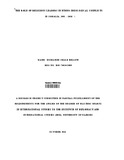The role of religious leaders in Ethno-Ideological conflicts in Somalia, 1991-2010
| dc.contributor.author | Kassim Amina Sheikh | |
| dc.date.accessioned | 2012-11-13T12:29:23Z | |
| dc.date.available | 2012-11-13T12:29:23Z | |
| dc.date.issued | 2012 | |
| dc.identifier.uri | http://erepository.uonbi.ac.ke:8080/handle/123456789/3568 | |
| dc.description.abstract | The Somali state collapsed in 1991 after the overthrow of Siyad Barre a nation that had the entire ingredient for successful state formation. It's cultural and religious homogeneity was ;unique in the continent but nevertheless collapsed. The collapse of the Somali state led to . intra clan conflict that lead to loss of life and property. The emergence of clan rivalry has led to the displacement of people from their homeland and become refugees within the country and outside the country. The humanitarian situation has necessitated international organizations such as the United Nations to respond to the dire need of the Somalis. Numerous efforts with the aim of restoring normalcy have been employed by various governments and inter-governmental bodies but all in vain. Some of the states such as Ethiopia have unilaterally intervened the Somali conflict exercepeting the already trouble situation of Somalia while the United Nations and IGAD have deployed peace keeping force. The failure of the international community effort has been the mismatch between the proposed institutional mechanism that is used for addressing the Somali conflict and the peculiarities of the Somali context. Somalis have a rich pastoral culture with well developed institution for conflict prevention, management and transformation. The militant use of religion by the Islamic groups and lack of accommodating the Islamic views by those fronting the secular agenda has frustrated the potential use of the religious leaders to resolve the conflict. The study seeks to establish the role of religious leaders in resolving the Somali conflict by examining their past role and mode of resolving conflicts The study utilizing both secondary and primary data made an effort to shed light on the role of religious leaders in the Somali conflict and thus a humble effort towards understanding the issues involved in the conflict. It recommended religious leader to be fully engaged in the management of the conflict. | en_US |
| dc.language.iso | en_US | en_US |
| dc.publisher | University of Nairobi, Kenya | en_US |
| dc.title | The role of religious leaders in Ethno-Ideological conflicts in Somalia, 1991-2010 | en_US |
| dc.title.alternative | Thesis (MA) | en_US |
| dc.type | Thesis | en_US |

